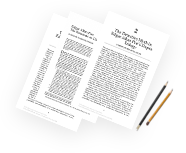|
CRJ325: Criminal Procedure |
Week 5 Assignment – Miranda Rule or Exception Template
Name: Click or tap here to enter text.
Professor Name: Click or tap here to enter text.
Date: Click or tap here to enter text.
Instructions:
For each of the 10 scenarios:
Determine whether the Miranda Rule applies or an exception to it is in order.
Justify your determination.
Note:
The first scenario is completed for you as a guide to completing the remaining nine scenarios.
Remember to use SWS to properly cite your sources.
|
Scenario |
Miranda Rule or Exception? |
Justification |
|
Example Scenario: A police officer handcuffs a criminal suspect who has been arrested for shoplifting and places him in the back of a patrol car. While the officer was obtaining personal information from the suspect, the officer said, “That was pretty stupid. Why did you steal those razors? Now you will have a record.” |
Miranda Rule |
In this scenario, the officer needed to mirandize the suspect because the suspect’s answer to the officer’s question would tend to incriminate him in the crime. The suspect had a right to be informed of his right to legal counsel before answering any questions pertaining to his possible involvement in a crime. If the officer informed the suspect of his rights before questioning him and the suspect chose to waive those rights and answer the officer’s question, then that information could be used against him in court. In addition, if the suspect made a spontaneous statement without being asked a question (e.g., “Man, I didn’t mean to do it.”) that statement can be used against him in court because the officer did not directly ask him a question. |
|
Scenario 1: Police officers place two suspects in the back of a patrol car, leaving the door open. The officers overhear the suspects’ conversation in which they say, “It was stupid to steal those bikes.” |
||
|
Scenario 2: During a traffic stop on reasonable suspicion, five officers surround a subject. The officers are aggressive in their speech and questioning. They ask the suspect, “Why did you rob that lady, you punk?” The suspect replies: “I’m sorry for doing it. Please don’t hurt me.” |
||
|
Scenario 3: Police officers have placed a criminal suspect in handcuffs. They believe the gun used in the crime is hidden in a supermarket. They ask the suspect, “Where is the gun you used?” |
||
|
Scenario 4: Police officers are conducting general on-the-scene questioning of witnesses about the facts surrounding a crime that just occurred. |
||
|
Scenario 5: Police officers frisk a person in a public place and find the person has an empty shoulder holster. The officers ask the subject, “Where is your gun?” The subject answers, “In my car.” The officers locate the subject’s vehicle nearby and find a loaded handgun under the seat. They arrest him for possession of unlawful weapon. |
||
|
Scenario 6: An officer on patrol notices a driver making an unsafe lane change. He pulls the driver over on suspicion of drunk driving. The officer says to the driver, “That was a very unsafe lane change back there. Have you been drinking?” The subject replies “Well I had a few drinks earlier.” After failing the field sobriety test, or FST, the police officer arrests the driver. He refuses to submit to a portable breath test. The subject pleads not guilty, and the case goes to trial. |
||
|
Scenario 7: Police officers arrest two suspects for robbery. They put each suspect in a separate room and begin interrogating them. Suspect 1 does not admit to the crime, nor does he implicate Suspect 2 in the crime. When officers interview Suspect 2, they tell him, “Your buddy rolled on you.” They inform Suspect 2 they plan to use Suspect 1’s testimony against him and suggest he may as well admit to the crime. Suspect 2 admits to the crime. |
||
|
Scenario 8: Someone stole a German shepherd puppy from a local breeder. The police receive a tip that the puppy can be found at a specific address. The officers go to the house, climb over the back fence, and see a German Shepard puppy. The homeowner sees them and asks, “What are you doing in my yard?” One of the officers asks the homeowner, “Is this your dog?” The homeowner admits the dog is not hers and that she stole the puppy from the breeder. |
||
|
Scenario 9: A police officer pulls over a vehicle for speeding. She notices several boxes in the back seat containing laptops. The officer asks the subject, “Are all of those computers yours?” The subject appears nervous and begins to sweat profusely. The officer then asks, “Those are stolen, aren’t they?” The subject replies, “Yes, they are.” The officer takes the suspect to the station for further questioning. |
© 2020 Strayer University. All Rights Reserved. This document contains Strayer University Confidential and Proprietary information and may not be copied, further distributed, or otherwise disclosed in whole or in part, without the expressed written permission of Strayer University.
Page 2 of 7




